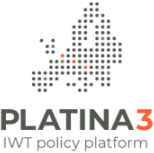Executive summary
This deliverable is providing follow-up of the Platina3 deliverable on competence for the use of alternative fuels and of the Platina3 deliverable on refresher classes for such fuels, the Platina3 deliverables D 3.1 and D 3.2.
Within the consortium, experts from international organisations in charge of safety of transport on inland waterways such as the Secretariat of the Central Commission for the Navigation of the Rhine (CCNR) and the Secretariat of the Danube Commission, social partners (represented by the European Transport Workers Federation (ETF) and IWT platform) and education institutes tried to propose what could be the best way to deal with future competences of the personnel related to the use of zero or low emission propulsion systems.
This deliverable shows how the PLATINA3 findings related to competences on zero or low emission propulsion systems can be concretely integrated into the CESNI standards.
This deliverable recalls the dialogue between the scientific research carried out within PLATINA3 and the transformation of this research into European-wide usable technical standards.
This report provides:
- the methodology used in CESNI/QP to use the PLATINA3 input and make it an applicable standard;
- a possible approach for the future, including draft standards for practical examination for relevant qualifications identified by CESNI experts (to be submitted to CESNI).
- a collection of the first feedbacks from experts from CCNR and EU Member States united in CESNI and questions of principle that remain to be discussed, even outside CESNI when it comes to police regulations, which are most of all related to:
- the responsibility of the proposed experts for alternative fuels in relation to the responsibility of the boatmaster who has the overall responsibility for the craft, the persons on board and the cargo.
- the number and periods of presence that could be required from the experts (e.g. presence only in case of maintenance and replacement of batteries or at all times).
CESNI will first focus on the definition of the specific experts following the timing developed for the update of the European Standard on Technical Requirements in Inland Navigation (ES-TRIN). In parallel, competent legislators such as River Commissions and Member States may wish to introduce the specific experts in the applicable manning requirements or use the standards developed by CESNI/QP to enrich recommendations for individual craft serving as pilot projects, before new regulations have been added to ES-TRIN and ES-QIN.
The first stage of receipt of PLATINA3 deliverables by CESNI/QP is very positive and conclusive. In general, it can be said that the work performed in PLATINA3 gives both a very concrete approach with the proposal of competence tables but also paves the way for future reflections that will have to be done to consolidate the new competences. They contributed to a certain awareness of the global challenges that CESNI/QP will work on in the coming months and years.

